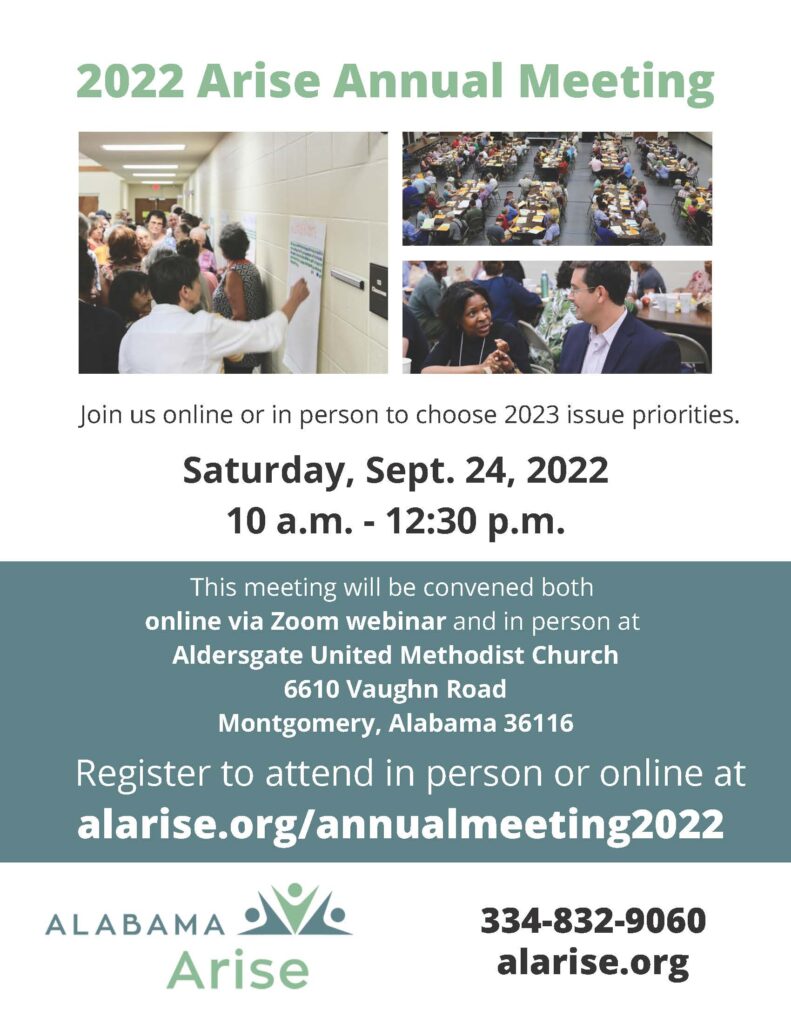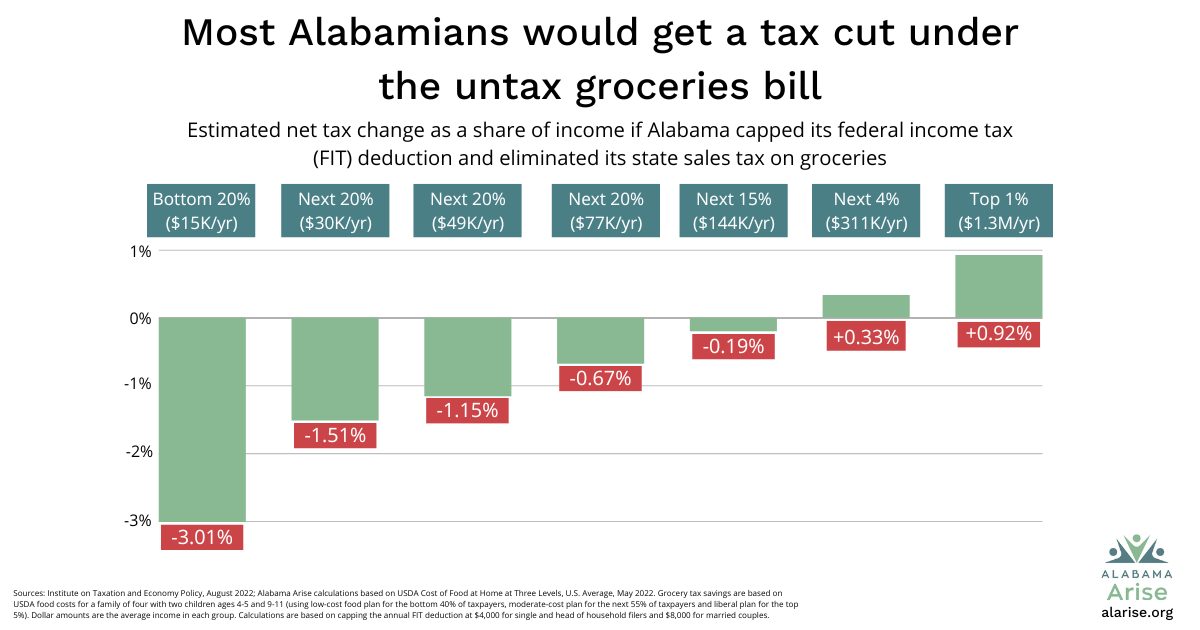Inflation Reduction Act will make Alabama healthier
By Robyn Hyden, executive director
The Inflation Reduction Act will help build a healthier future for people across Alabama. This plan will make health coverage more affordable for hundreds of thousands of Alabamians and millions of Americans. It will improve air quality by investing in clean energy and reducing emissions that fuel climate change. And it will pay for these investments by closing tax loopholes that subsidize profitable corporations and wealthy households.
This plan will save money for patients and the federal government by allowing Medicare to negotiate certain prescription drug prices. It will cap the cost of insulin and other out-of-pocket drug expenses for Medicare enrollees. And it will extend enhanced subsidies that make health coverage more affordable for many of the 219,000 Alabamians with marketplace plans through the Affordable Care Act.
We’re happy that Congress passed this important legislation and that President Joe Biden signed it into law on Aug. 16. But we also know much work remains to empower all Alabamians to achieve their full potential.
We will continue advocating for state lawmakers to untax groceries and make other needed investments in families and communities. We’ll keep working for additional funding to make child care, housing and public transportation more affordable and available across Alabama. And we’ll continue pushing for Medicaid expansion to help more than 340,000 Alabamians who are uninsured or struggling to afford health insurance.
These policy choices are essential to improve Alabamians’ quality of life and to boost our state’s economic prosperity. We’re determined to see each and every one of them across the finish line. And with your support and energy – at the annual meeting and throughout the coming years – we’ll make it happen together.
Annual meeting to chart Arise’s course for 2023
By Chris Sanders, communications director
Grassroots democracy will be on display in a new way when Alabama Arise members choose our 2023 issue priorities at our annual meeting Saturday, Sept. 24. For the first time, we will meet both in person and online via Zoom.
As a member, you have the power to select the legislative priorities we will pursue in 2023. One new proposal will compete with five current priorities for five slots on next year’s issue roster.
Below, you’ll find more information on the annual meeting, along with member groups’ summaries of the new issue proposal. You’ll also find our policy staff’s overviews of the current issue priorities and updates on our two permanent priorities: adequate state budgets and tax reform.
We hope to see you in September as we gather to renew our shared commitment to building a better Alabama for all!

Things to know for our annual meeting
When:
Saturday, Sept. 24, 2022
10 a.m. to 12:30 p.m.
Where:
This is a hybrid event with options to attend in person as well as remotely via Zoom. To register, visit alarise.org/annualmeeting2022. There is no cost to attend, though donations are welcome.
Voting rules:
Member groups may cast up to 42 votes for issue priorities. Before the annual meeting, groups may designate up to six representatives to get seven votes each. Individual members get five votes each. (A person can vote as an individual or as a member group’s representative, but not both.)
Groups must be current on dues to be eligible to vote. Individual members must have given between July 1, 2021, and Aug. 25, 2022, to be eligible.
Voting for issue priorities will be conducted online. Members will present issue proposals during the meeting. Eligible voters will receive a link and instructions after the meeting. If Arise doesn’t have your email, you will receive a postcard with voting information.
For more information:
If you have questions or need to update your contact info or group voters, call 334-832-9060 or email info@alarise.org.
Permanent issue priorities
Tax reform
 Alabama legislators made minimal improvements to the state’s broken tax system during the 2022 regular session. As is common in an election year, they passed tax breaks for businesses, local nonprofits and retirees. On a more progressive note, lawmakers excluded the federal Child Tax Credit from state taxation. They also approved an income tax cut for Alabamians with low incomes through small but meaningful improvements to the standard deduction and dependent exemption.
Alabama legislators made minimal improvements to the state’s broken tax system during the 2022 regular session. As is common in an election year, they passed tax breaks for businesses, local nonprofits and retirees. On a more progressive note, lawmakers excluded the federal Child Tax Credit from state taxation. They also approved an income tax cut for Alabamians with low incomes through small but meaningful improvements to the standard deduction and dependent exemption.
Still, despite a bipartisan push and strong public support, legislators again failed to take the state sales tax off groceries. To improve life for everyday Alabamians of all backgrounds and strengthen public services that benefit us all, the Legislature should:
- Eliminate the state sales tax on groceries and replace that revenue through progressive income tax changes. Alabama is one of three states with no grocery tax break.
- Eliminate the regressive state income tax deduction for federal income taxes. Nearly 90% of the deduction’s benefits go to the top 20% of households.
- Reject future corporate tax cuts and adopt combined reporting to prevent corporate tax avoidance.
- Increase property taxes on large landowners and raise taxes on items like tobacco and vaping products.
Compiled by Carol Gundlach, senior policy analyst
Adequate state budgets
 Thanks in part to federal relief funds, Alabama went into 2022 with significant revenue increases despite the COVID-19 recession. This allowed the Legislature to pass 2023 budgets with record expenditures, including salary increases for state employees and teachers. Revenues have remained healthy, and the state likely will have enough money to cover basic needs in its 2024 budgets.
Thanks in part to federal relief funds, Alabama went into 2022 with significant revenue increases despite the COVID-19 recession. This allowed the Legislature to pass 2023 budgets with record expenditures, including salary increases for state employees and teachers. Revenues have remained healthy, and the state likely will have enough money to cover basic needs in its 2024 budgets.
This rare surplus could allow legislators to consider how to address Alabama’s long-term investment needs. The Legislature should take advantage of this opportunity to:
- Close the Medicaid gap and provide life-saving health coverage to more than 300,000 Alabamians.
- Replace the state sales tax on groceries by increasing income taxes on the top 1%.
- Increase spending for mental health care, substance use treatment and public health services.
- Fund alternatives to incarceration such as drug treatment, mental health treatment, job training and community correction services.
- Expand pre-K education and child day care services.
- Invest for the first time in the state Housing Trust Fund and Public Transportation Trust Fund.
Pathways for Medicaid expansion
The American Rescue Plan Act (ARPA) includes a provision that would allow Alabama to access an estimated $619.4 million in additional federal funds. This would make Medicaid expansion more affordable and sustainable than it has been since expansion first became available in 2014. This additional money, on top of the generous and permanent 90/10 federal match of state Medicaid expansion funds, could result in the federal government covering $397 million in annual expenses now paid by the state.
Alabama Medicaid thus far has not used those additional funds to increase services. However, the Legislature this year did provide additional General Fund money to extend Medicaid postpartum coverage from 60 days to 12 months after childbirth starting this October.
Compiled by Carol Gundlach, senior policy analyst
New issue proposal
Universal broadband access
Submitted by Anna Pritchett, AARP Alabama, and Benard Simelton, Sr., Alabama Chapter of the NAACP
 High-speed internet access, affordability and training are essential. High-speed internet enables all Alabamians to benefit fully from technologies that improve quality of life. Broadband can facilitate access to education, health care, career services and more. To have these options, high-speed networks must be available, affordable and support bandwidth-intensive applications for a rapidly growing user base.
High-speed internet access, affordability and training are essential. High-speed internet enables all Alabamians to benefit fully from technologies that improve quality of life. Broadband can facilitate access to education, health care, career services and more. To have these options, high-speed networks must be available, affordable and support bandwidth-intensive applications for a rapidly growing user base.
Last year, the Legislature created the Alabama Digital Expansion Division within the Alabama Department of Economic and Community Affairs (ADECA) to oversee and advise the statewide connectivity plan. This move came just as federal funds from the American Rescue Plan Act and the Bipartisan Infrastructure Law are flowing into the state. This is a welcome start, but much work remains to ensure transparency, accountability, equity and affordability.
Roughly 19% of Alabama homes do not have adequate broadband coverage, according to the Alabama Connectivity Plan. For areas with coverage, approximately 20% of Alabama households do not subscribe to high-speed internet services due to the costs.
For the upcoming year, Alabama Arise can advocate for the Legislature and ADECA to:
- Eliminate the barriers to adoption of high-speed internet using strategies such as creating a task force to ensure the Alabama Digital Expansion Division is adequately working to connect the 19% of Alabama households without broadband services.
- Support the adoption of state and local digital equity policies and programs.
- Promote informed decision making by requiring the state and localities to utilize data-driven policymaking like improving broadband data collection, analysis and reporting to target intervention effectively to those most likely to be left out.
- Develop a multipronged public outreach campaign to connect consumers to federal subsidy programs.
Current issue priorities
Criminal justice reform
 Court fees and fines impose heavy burdens on many struggling families. Driver’s license suspensions over unpaid fines can cause Alabamians with low incomes to lose their jobs. Draconian sentences keep many people in prison far beyond any bounds of proportionality or purpose. Cash bail for minor offenses can imperil families’ economic security. And multiple fees can stack up, making it impossible to move on from a conviction because consequences never end. In Alabama, people are subject to 63 separate fees in the criminal justice system – including a $1 fee for paying fee installments.
Court fees and fines impose heavy burdens on many struggling families. Driver’s license suspensions over unpaid fines can cause Alabamians with low incomes to lose their jobs. Draconian sentences keep many people in prison far beyond any bounds of proportionality or purpose. Cash bail for minor offenses can imperil families’ economic security. And multiple fees can stack up, making it impossible to move on from a conviction because consequences never end. In Alabama, people are subject to 63 separate fees in the criminal justice system – including a $1 fee for paying fee installments.
Arise supporters achieved a major victory this year with passage of HB 95, which created a 180-day grace period for formerly incarcerated people to begin payments on their fines and fees. HB 200, which would have limited the circumstances under which driver’s license suspensions could be issued, also made significant progress through the Legislature before eventually falling short. This bill will be a top priority for our criminal justice advocacy in the upcoming session.
The state’s sentencing scheme still needs systemic overhaul. Broad coalition efforts to reform the state’s sentencing structure, decouple financial payments from voting rights restoration, and institute other reforms that allow Alabamians to rebuild their lives after convictions continue. Arise has the opportunity to advance our core mission by pushing these reforms forward.
Death penalty reform
 Alabama’s capital punishment system is unjust, unreliable and often used in a racially biased manner. Our state executes at nearly double the national average. We’re the only state that doesn’t fund legal aid to death row prisoners. And state laws offer insufficient safeguards against executing people who are mentally incapable of understanding their actions.
Alabama’s capital punishment system is unjust, unreliable and often used in a racially biased manner. Our state executes at nearly double the national average. We’re the only state that doesn’t fund legal aid to death row prisoners. And state laws offer insufficient safeguards against executing people who are mentally incapable of understanding their actions.
People’s lives shouldn’t depend on which administration is in power or whether state judges face election that year. Arbitrariness in death sentences is a longstanding and shameful failure of the criminal justice system.
Alabama is the only state that permits death sentences to be issued via non-unanimous jury sentencing decisions. Arise has supported a bill to remedy that injustice. We’ve also supported bills to create an execution moratorium and increase transparency in lethal injection procedures. And we support legislation to make the 2017 ban on judicial override apply retroactively. That law forbade judges from imposing a death sentence when the jury recommends life imprisonment without parole. But the law didn’t apply to people already on death row.
Alabama’s death penalty practices reflect deep racial inequities. Before judicial override ended, judges imposed death against a jury’s determination more often in cases where victims were white. And the state argued as recently as 2016 that it should be able to kill a prisoner even when a judge explicitly cited race at the sentencing hearing. Much work remains to modernize Alabama’s justice system and prevent unjust executions.
Payday and title lending reform
 Every year, high-interest loans trap thousands of struggling Alabamians in a cycle of deep debt. Payday loans are short-term (usually two-week) loans charging high annual percentage rates (APRs), most commonly 456%. Auto title loans charge up to 300% APR and also carry the risk of repossession of the vehicle. Alabama also has no title loan database, leaving the extent of harm from these loans unknown.
Every year, high-interest loans trap thousands of struggling Alabamians in a cycle of deep debt. Payday loans are short-term (usually two-week) loans charging high annual percentage rates (APRs), most commonly 456%. Auto title loans charge up to 300% APR and also carry the risk of repossession of the vehicle. Alabama also has no title loan database, leaving the extent of harm from these loans unknown.
These high-cost loans strip wealth from borrowers and hurt communities. Payday lenders are on track to pull approximately $1 billion in fees out of Alabama communities over the next decade, with most of that money flowing to out-of-state companies. Predatory lending practices disproportionately target people of color and exacerbate the economic challenges in struggling rural and urban areas.
Arise and partners have supported reforms for more than 15 years. Recent state-level efforts have run into well-financed lobbying to stall popular reforms, but the federal landscape has improved recently. In June 2021, the U.S. House voted to roll back a rule allowing payday lenders to use federal bank rules to avoid state interest caps. And in the U.S. Senate, the Veterans and Consumers Fair Credit Act would extend the Military Lending Act’s 36% rate cap to other consumers.
Public transportation
 Robust state investment into public transportation would improve the quality of life for many Alabamians. Transit availability affects a wide range of Alabamians of diverse geographies, incomes and races. Many people, whether transit-dependent or not, have witnessed or experienced barriers posed by the state’s inadequate transit services.
Robust state investment into public transportation would improve the quality of life for many Alabamians. Transit availability affects a wide range of Alabamians of diverse geographies, incomes and races. Many people, whether transit-dependent or not, have witnessed or experienced barriers posed by the state’s inadequate transit services.
For seniors, workers with low incomes and individuals with disabilities, the lack of reliable and affordable transportation is a barrier to daily living. The lack of vehicles, drivers and funding means many Alabamians cannot get to work, school or the doctor’s office in a reasonable time. The COVID-19 pandemic only worsened the harm resulting from lack of state support of transportation. Limited funding has forced some local transit systems to curtail specialized services for riders with disabilities or serious health conditions.
Alabama is one of only three states that provide no state funding for public transportation. The Legislature took steps to remedy this failing by creating the Public Transportation Trust Fund (PTTF) in 2018. However, the law did not provide an initial appropriation or a dedicated funding source. If funded, the PTTF could allow for increased federal investment that requires non-federal matching dollars.
Next year, Alabama has an opportunity to advance public transportation by investing $20 million from its remaining American Rescue Plan Act funds into the PTTF. This move would empower the state to improve quality of life for everyone through expanded, reliable public transportation.
Voting rights
 One shameful legacy of Alabama’s white supremacist history is a voting rights structure hostile to democratic participation, especially for people of color. Our state still creates and preserves barriers that prevent otherwise qualified citizens from voting. One example was Alabama’s 2015 attempt to close driver’s license offices in the Black Belt soon after passage of a strict photo ID voting requirement.
One shameful legacy of Alabama’s white supremacist history is a voting rights structure hostile to democratic participation, especially for people of color. Our state still creates and preserves barriers that prevent otherwise qualified citizens from voting. One example was Alabama’s 2015 attempt to close driver’s license offices in the Black Belt soon after passage of a strict photo ID voting requirement.
Arise seeks to remove systematic barriers to democracy by creating automatic voter registration (AVR) and ending the modern poll tax of forcing some formerly incarcerated people to pay all fines and fees before regaining voting rights. AVR would save the state millions of dollars and would likely increase turnout rates significantly. For example, Georgia’s turnout rate increased more than 10% after implementing AVR.
The 2022 regular session saw some modest progress toward greater voter access. A bill improving the voting rights restoration process passed the Senate but not the House.
But alarmingly, lawmakers also introduced many bills that threatened to limit voting rights and voter participation. Unfortunately, one of them (HB 194) became law over fierce opposition. This act, still unclear in its application, could chill get-out-the-vote efforts by nonprofits and community groups. We expect to see more bills next year, fueled by false narratives about the 2020 election, that would harm many Alabamians’ ability to vote.
Compiled by Rebecca Howard, policy and advocacy director, and Mike Nicholson, policy analyst
Welcome to Arise, Jacob!
 Jacob Smith joined Arise in May as the development director. In his role, he ensures the
Jacob Smith joined Arise in May as the development director. In his role, he ensures the
organization’s financial stability by overseeing corporate and foundation relationship management and individual giving and membership. Jacob has more than a decade of nonprofit experience in fundraising and program management. Jacob previously served as the senior director, philanthropy and research at Women’s Foundation of Alabama and as assistant director of development at YWCA Central Alabama.
We’re hiring!
Arise policy and advocacy director Rebecca Howard has accepted a staff position in the U.S. Senate. We’re seeking a new policy and advocacy director to continue our work for dignity, equity and justice for Alabamians who are marginalized by poverty.
The ideal candidate will be an experienced manager and public policy advocate who is passionate about justice, opportunity and racial equity. Visit alarise.org/about/employment for more details on the position and information on how to apply. Applications will be accepted until Wednesday, Aug. 31, 2022, at 11:59 p.m. CDT.




